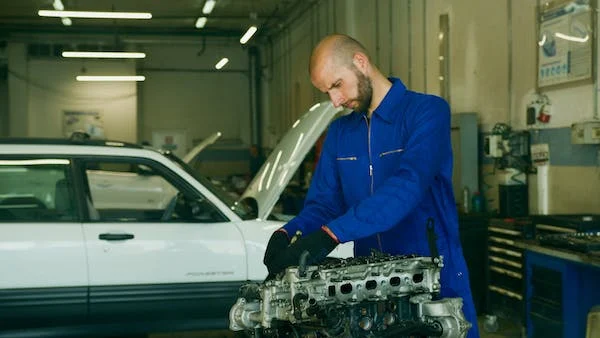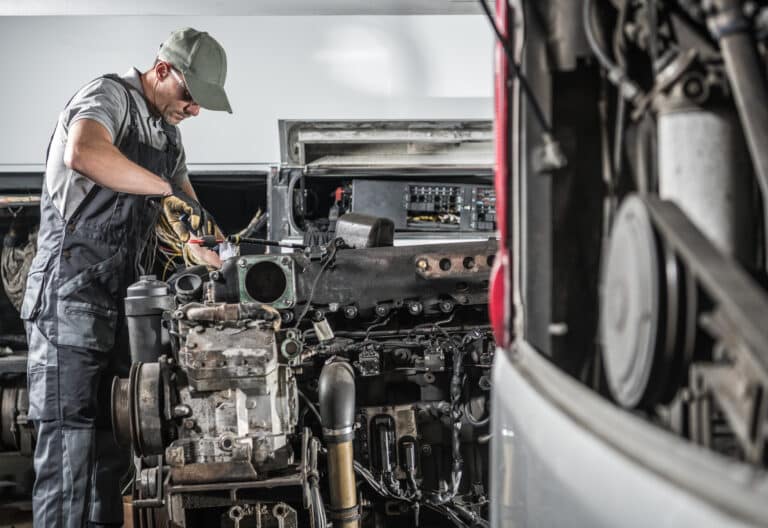The demand for diesel mechanics is increasing every year, and according to the U.S Bureau of Labor Statistics, the job growth for Diesel Technicians is expected to rise by 4% in the next ten years. If you want to start a career as a diesel mechanic, you need the right training. This is where students get confused, as there are multiple programs to choose from.

In this article, we will discuss the different training programs and how to find a program that fits your needs.
Not only that, we’ll also talk about how you can start your career without student debt and without driving to classes every day.
Diesel Mechanics Training Options
There are multiple training options available for becoming a diesel mechanic. Picking the right training program is important, which can get confusing if you are just starting out.
You can choose from three major training types to start your journey of becoming a certified diesel mechanic.
The minimum requirement for becoming a diesel mechanic is to complete your high school diploma or a GED. After getting your high school diploma, your next step should be enrolling in an accredited diesel mechanic training program or a diesel mechanic school.
Before you start applying for diesel mechanic jobs, it is recommended to get certified by ASE. You can take their entry-level certification exams like the G.1 certification.
There are three main ways to complete your diesel technician training, such as:
- Completing an Associate’s Degree from a technical university or college
- Completing a diploma or certification course from a community college or trade school
- Completing a certification course through online programs

Let us learn more about each of these types of training in detail and find out which will work best for you-
Option A – Enrolling in a Full-Time Associate Degree Program
Duration: 2 years
Cost: $30,000 – $50,000
Enrolling in a full-time associate degree program has been the popular option. These degrees usually last up to 2 years.
Even though completing an associate’s degree is popular for entering the trade industry as a Diesel Technician, there are several disadvantages attached to enrolling in a full-time degree program, such as:
High enrollment fee
The main disadvantage of enrolling in a full-time degree is the high cost that you will need to spend for the duration of the course.
The average cost of an associate’s degree is $30,000 to $50,000, and if you are interested in pursuing this course, you could get into student loan debt.
Attending classes according to a schedule
A full-time degree will require you to attend lectures or classes on a schedule set by the university. If you happen to miss a class or two, rescheduling a class is another hassle. It sometimes takes months to reschedule and attend one missed lecture, eventually making you lag behind or miss out on important topics.
Long Course Duration
The long duration of the course is another disadvantage when it comes to getting an associate’s degree. You will need to dedicate a minimum of 2 years to complete a full-time degree program, and your life is on hold for these two years.
Enrolling in a diploma or a certificate program through a community college or trade school will have similar disadvantages. They are relatively faster and cheaper, but similar problems exist for them as well. (Read More: how long is diesel mechanic school)
Read More:
What is a Diesel Mechanic?
How to become a Diesel Mechanic?
Diesel Technician Salary
What does a diesel mechanic do?
Option B- Enrolling in an Online Program
Duration: 6-12 Months
Cost: $1,000 – $5,000
If you’re interested in starting your career as a Diesel Mechanic quicker than the conventional two years an associate’s degree takes, then choosing an online program is your best bet.
Enrolling in an online program over an associate’s degree has several advantages. And here’s why an online training program makes sense-
Perks of Online Programs
- Minimal tuition costs
The cost of enrolling in an associate’s degree is significantly higher than in online programs. Where an associate’s degree can cost you an average of $50,000, an online program can be completed for under $5000.
This is highly beneficial for you if you’re just starting your career, as you will not have to take on unnecessary student debt.
- Attend Classes on Your Own Schedule
Attending a regular full-time college will require you to attend classes on a set schedule, and if you happen to miss any classes, then rescheduling them is a hard battle. However, enrolling in an online program gives you greater flexibility.
You can learn at your own pace & schedule, and you can also catch up and attend all classes.
- Zero Additional Expenses
Choosing an online program will also help you cut all other expenses, such as travel and other daily expenses, that are generally required if you choose a full-time degree program. You can learn from the comfort of your home without bearing any extra costs.

- Shorter Duration of Courses
One of the main benefits of online programs is shorter duration. You can complete an online program in as little as 4 to 6 months and jumpstart your career as a Diesel Mechanic faster.
- Prepares You for ASE Certifications
As a Diesel Mechanic, the more ASE certs you have, the better.
There are select Online programs that help you prepare for entry-level ASE certification exams. (Such as the G.1 Certification exam)
Choosing an online program that prepares you for an entry-level ASE diesel mechanic certification is recommended.
- Helps You with Externships
A field like Diesel Mechanics requires you to work with diesel engines and vehicles every single day. When you enroll in an accredited online program, make sure they have an option for you to gain hands-on experience.
Generally, you can get some hands-on experience with the help of a local externship.
Conclusion
Choosing the right training is the most important decision if you wish to enter this rewarding field. If you wish to become a Diesel Mechanic without taking on a student loan or debt, then picking an online program is highly recommended.
Related:
Diesel Mechanic Apprenticeship
Diesel mechanic tools
Mobile Diesel Mechanic
Heavy Duty Diesel Mechanic
Marine Diesel Mechanic
Diesel Mechanic Job Description
Diesel Mechanic Resume
diesel mechanic training




